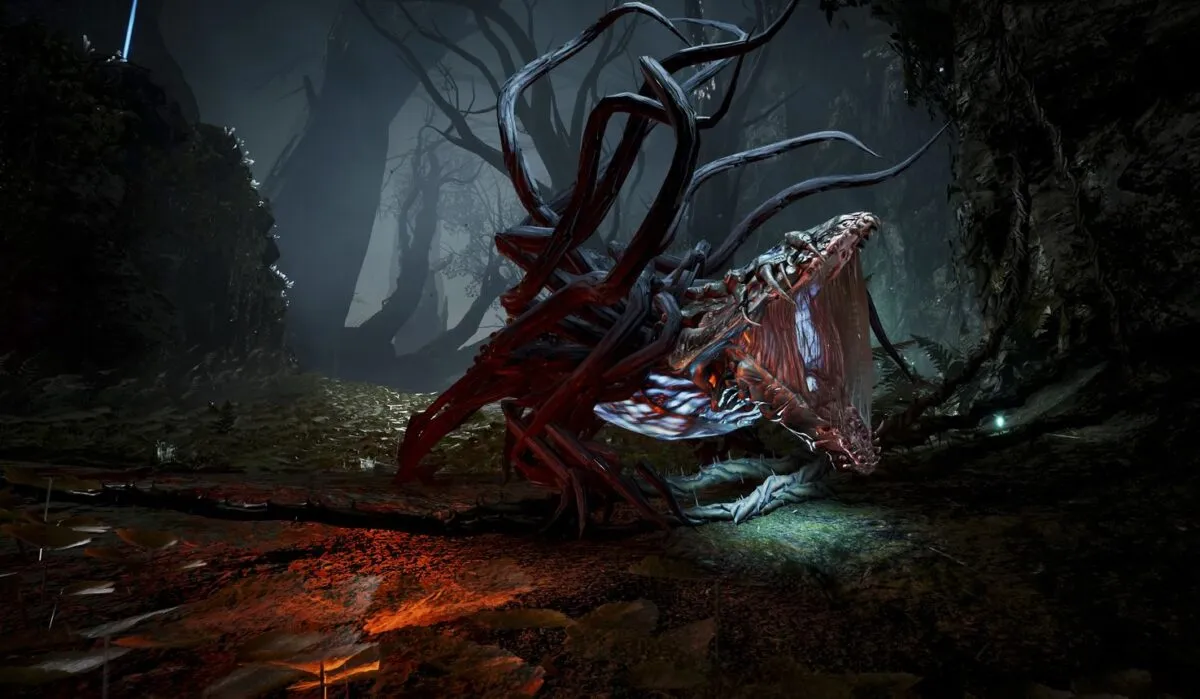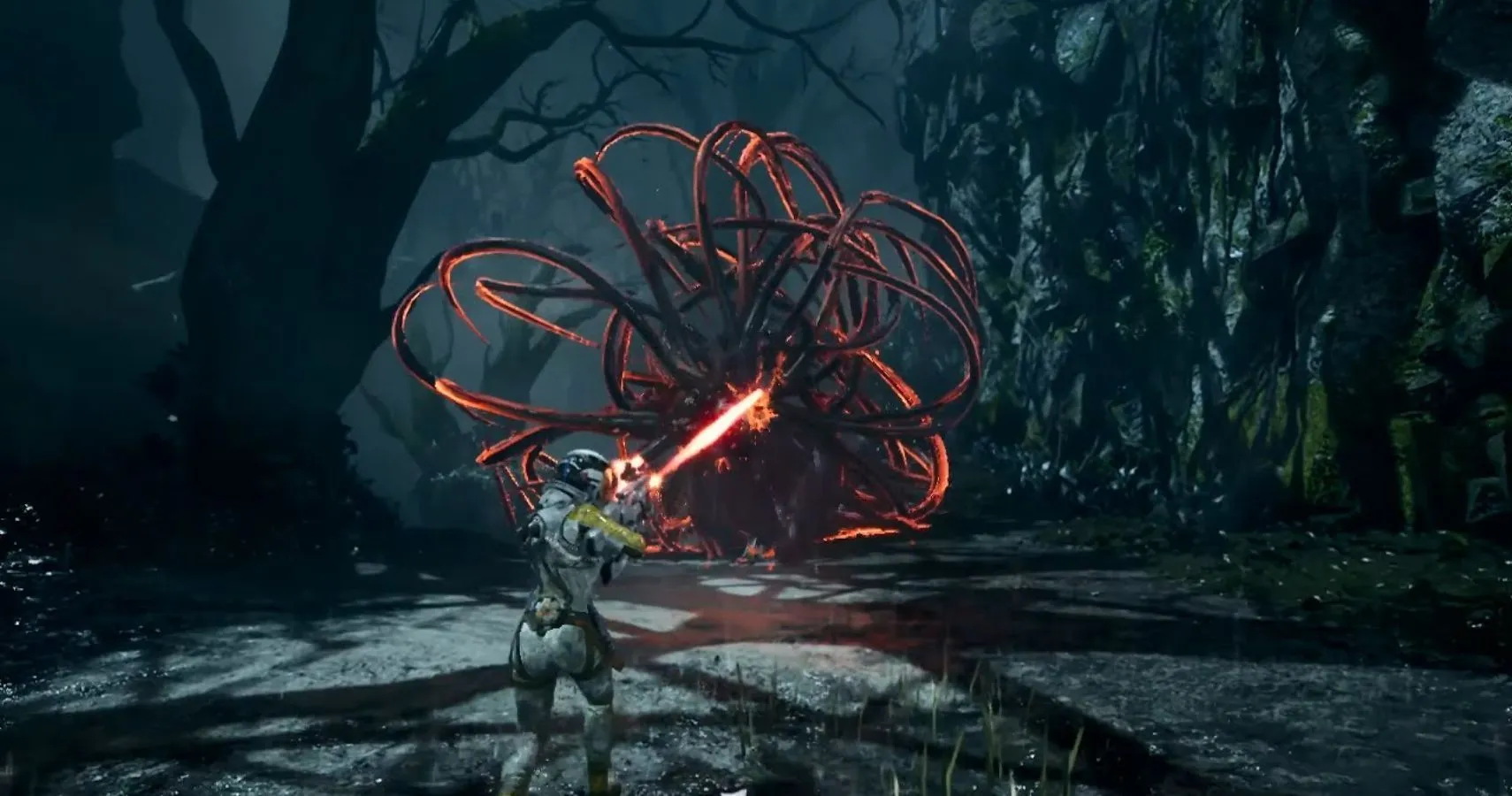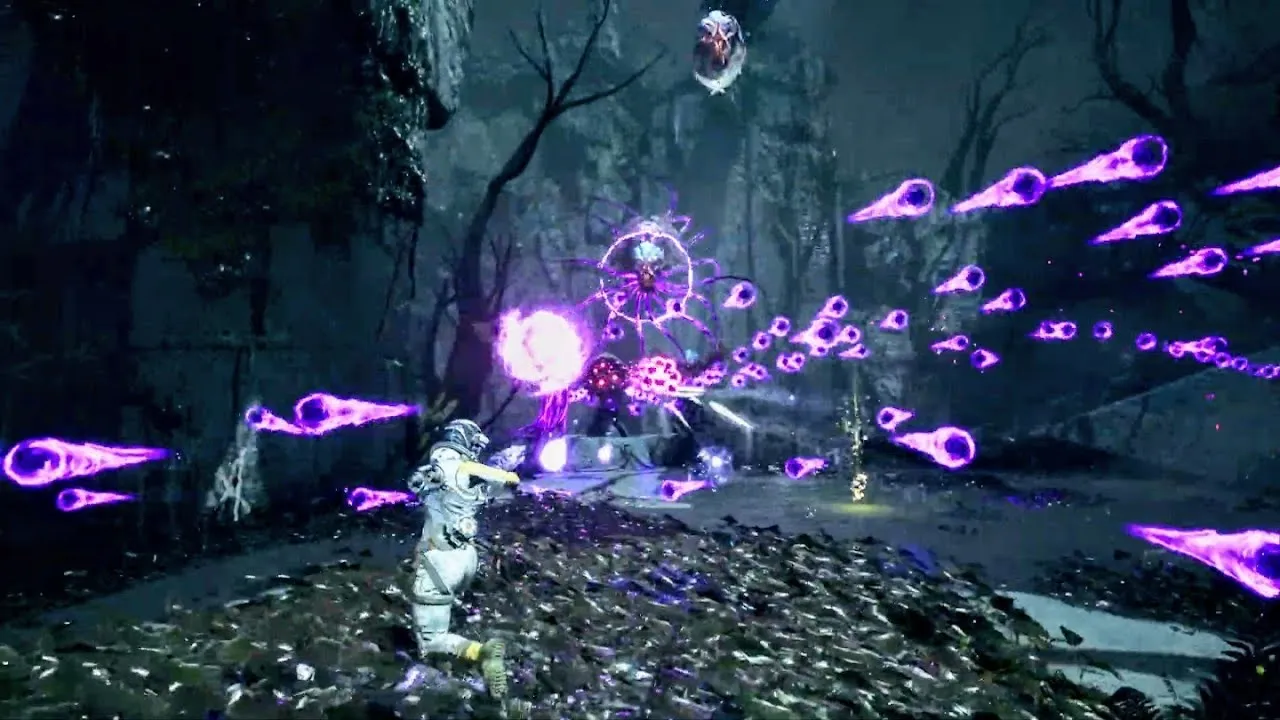Returnal, like any good roguelike, pits you against seemingly insurmountable odds. Then, atop a mountain of your own corpses, you’ll triumph, only to be faced with more and more trying challenges as the game goes on. Add in a Lovecraft-inspired aesthetic, tightly designed roguelike mechanics, satisfying combat, and a mostly gripping narrative, and Returnal is a game worth your time.
Returnal is also the first game in all of the PlayStation 5’s software library, outside of, say, Astro’s Playroom, to make real use of a lot the system has to offer. You’ll experience consistent haptic feedback and have different firing modes depending on how far you depress a trigger. The 3D audio is beautifully paired with top-notch sound design. Load times are the shortest they’ve ever been, and the game generates its random environments without a single hitch.
There are a few foibles here and there, from the occasional bit of over-written exposition or frame stutters during long play sessions. The lack of a save and quit function is unforgivable when Demon’s Souls solved the mid-game save problem in 2009. There’s also the occasional pacing issue and mechanical disconnect between going through levels and fighting bosses.
Don’t be dissuaded, though. If you’re a fan of the roguelike genre, or even just weird, cosmic horror science fiction, Returnal provides in spades.
Returnal Review: Discover What Lies in the Deepest Reaches
Returnal takes place on the alien planet of Atropos, where Selene, a scout of aeronautics company ASTRA, seeks out a mysterious White Shadow transmission. It soon becomes clear there is more going on here than just a signal transition, however, as Selene soon finds herself trapped by the planet, unable to stay dead when killed.
The reason for these roguelike elements is either cryptic or left intentionally vague. What you do know is the levels shift each time you begin a new run, called a “cycle” here. The randomization is more akin to something like Bloodborne’s chalice dungeons than the more granular procedural generation in a game like Dead Cells.
Rooms pull from a table of prefabricated pieces, with some more bespoke spaces for scripted encounters or loot and other upgrades. You’ll grow familiar with the basic layout of the rooms as you play, with your biggest guessing game being how they’re arranged, not what’s in them. Even then, you can make good educated guesses about where the merchant room (called a fabricator) will be or where you’ll probably find the boss, the latter of which are denoted by red doors on the map.
Never Defenseless
You’ll start every cycle with a simple sidearm. It’s useful but unremarkable. As you move through each biome, loot chests and boss-type enemies drop upgraded weapons. Each weapon you come across has a Proficiency level that determines its effectiveness the more you use it.
Higher Proficiency weapons can also have additional upgrades. You’ll reach Proficiency 25 or so by the end of the game, with up to four upgrade abilities modifying how the weapon functions. You’ll unlock new upgrades from new weapons you find during a cycle by killing enemies and filling the upgrade bar.
You’ll also improve your character by using Artifacts — per run items that grant a powerful bonus under specific circumstances — and Parasites, which confer both a random benefit and detriment. Lastly, you’ll have a growing selection of consumables and the ability to upgrade your health by picking up healing items scattered about levels.
The gameplay loop of finding new weapons, unlocking additional Artifacts, and improving and altering that cycle’s character is surprisingly satisfying. The system lacks the sheer depth you’ll find in Hades or Dead Cells, but it is quite a bit more detailed than a purer roguelike experience. There are very few permanent unlocks between cycles, making every resource precious.
The unlocks you do find take two forms. The first is Ether, a consumable currency for purifying Malignant items and containers, as well as powering Reconstructors. There are also various types of Xeno-Technology that open up new areas of the map either to additional materials or previously walled-off levels.
You’ll find a flow as the game progresses, collecting weapons, upgrades, and Obolites, the standard currency dropped by enemies and scattered about the maps. Then, once you’ve cleared a level once, you’ll have access to the next level without needing to fight the current level’s boss again.
Take Your Fight to the Cycle
It doesn’t take long to find a good rhythm in Returnal. Fighting your way through the first levels, making it to the boss, failing a few times, then overcoming them, only to start the whole process again in the next biome, the next cycle.
Each cycle also reveals more of Returnal’s story through visitations from the past and various Xenoglyph writings. The narrative is purposefully opaque, leaving much to the imagination for most of the game’s runtime. Even at the end, answers can be hard to come by, though there are some things the game makes fairly clear I won’t go into here.
Thankfully, every cycle is unique enough, and the moment-to-moment gameplay enjoyable enough, that you won’t mind the occasional disruption for story.
The tale itself takes on some heavy stuff, and it does so with care and a lot of attention given to the weight of the decisions that lead each character to this point in their lives. It’s not perfectly told, as the writers can sometimes be a little too proud of themselves, making the writing feel overwrought and needlessly grandiose.
While the exposition can get in its own way, the worldbuilding does not. Everything is on point: from the way the levels are built to the alien environments of Atropos to the godlike beasts that lurk in the shadows. Throughout the story, events only grow stranger as reality seems to bend further and further toward a breaking point.
Don’t Fear the Cycle
Returnal will test your sanity as much as it does Selene’s thanks to a high level of difficulty that only ramps up deeper into the game. Each new biome introduces enemy types with new attacks, new patterns, and new effects. The amount of visual effects on screen, most of which can kill you, also increases exponentially as you play.
It’s a testament to the PS5 that the game doesn’t chug or hitch during these intense moments, as even some PCs would have trouble pulling off so many particle effects at once without stutter or frame drops.
However, some of the arenas you fight in don’t always feel appropriate for either the enemies you fight or the density of the enemies inside. When you run across the rocket launching drones in groups of 10 or more, in a space too small to accommodate all those missiles, you’ll know what I mean.
Your deaths are usually your fault despite the level of randomization. Returnal has a fair few tutorials, but these mostly involve mechanics your character does, not that the world does. You’re as liable to die because of a pit or enemy attack you’ve never seen before as a miss-timed dodge or because you messed up this mechanic or that one.
It can be frustrating too to find yourself at the mercy of an offscreen enemy or needing just one more second to kill the trash mob throwing missiles at you. It’s rarely a lack of preparation that will get you killed because once you know what a fight will take or how to handle a certain kind of enemy, they aren’t themselves the threat. It’s the possibility of being overwhelmed that’s the real problem.
Big Boy Fights
Boss fights are in a tough position in Returnal because they have to be both unique one-on-one encounters and also provide that threat of being swarmed. Boss attacks, therefore, take up a metric ton of screen space. The visual noise in the fights can be terrible, and you’ll spend half your time trying to make out what’s going on as you will damaging the boss.
Bosses are also comparatively easier than going through levels, as after a few fights, you know what each attack pattern is and how to deal with it. This is true of other roguelikes, of course, but because of the lack of build variety in Returnal, you end up going through the motions more often than you do experimenting with new ways of dealing with the boss.
Each fight is, like the worlds they capstone, unique and asks something new of you, usually building on the mechanics you’ve learned to that point. The fights all have three phases, and this tends to alter the fight in some way, either through new attacks or mechanical changes. It would have been nice if some of the bosses turned gameplay on its head rather than simply increasing the challenge a bit.
A Human Touch to an Alien World
Despite the bosses falling somewhat short in the gameplay department and the story feeling precious from time to time, Returnal’s core conceit is remarkably human for the world where it takes place. This fact is both its greatest triumph and largest problem.
The game has to toe the line between alien, Lovecraft-inspired action roguelike, and subdued, darkly emotional narrative adventure. The pacing is all over the place as a result. One moment you’ll be adrenaline-fueled. The next, you’re taking part in a slow-paced walking section with weird narrative devices.
Returnal all but requires this shift of the player, too, if they want to understand fully what’s going on and why. Then, even if you do everything the game asks of you, some answers simply don’t exist. That’s all well and good for a game paying homage to Lovecraft’s mythos, but there are actually too many answers to questions here.
While there is plenty of room for interpretation, because the game’s story is ultimately one about Selene and not the strange world she’s been dropped into, Returnal loses some of the mystery as it chases the familiar.
Returnal Review — The Bottom Line
Pros
- Amazing roguelike gameplay with a satisfying loop
- Great world-building in a Lovecraft-inspired narrative
- The first full PS5 game to truly put the system through its paces
Cons
- Pacing issues of both the gameplay and story variety
- Occasional frame hitching and a lack of expected gameplay features like saves
- Lots of visual noise and randomization sometimes breaks the balance
Returnal offers a tightly designed roguelike with responsive controls, a well-realized world, and a solid roguelike gameplay loop with minimal but significant upgrade paths and plenty of challenge. It also makes generous use of the PS5 hardware, perhaps the first full game on the console to do so (Astro’s Playroom somewhat counts, but it’s also more a large tech demo).
The gunplay is also exquisite, even for someone more used to shooting on a mouse and keyboard than a pair of control sticks. There is a fair bit of visual noise, and some of the random arenas aren’t ideal for the more annoying enemy types or enemy density.
While compelling at times, the story suffers from pacing and clarity issues and doesn’t know exactly which side of the cosmic horror fence to land on. The focus is clearly on the roguelike elements and excellent moment-to-moment gameplay, with good reason, as these are the game’s strongest suits. The sound design is also top-notch, and the music is appropriate if not memorable.
If you’re looking for an experience that really takes advantage of the latest console hardware, Returnal offers it and a lot more. Does it justify its $70 price tag or the purchase of a PS5? That’s debatable, as I don’t consider Returnal a killer app the same way I would a Bloodborne or a Breath of the Wild. That doesn’t take away from the sheer quality on display here and the fact this is a game made with the future in mind, in-game or in the real world. Whatever that is.
[Note: The writer purchased the copy of Returnal used for this review and was reimbursed for their purchase.]












Published: May 6, 2021 10:51 pm